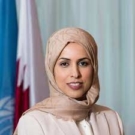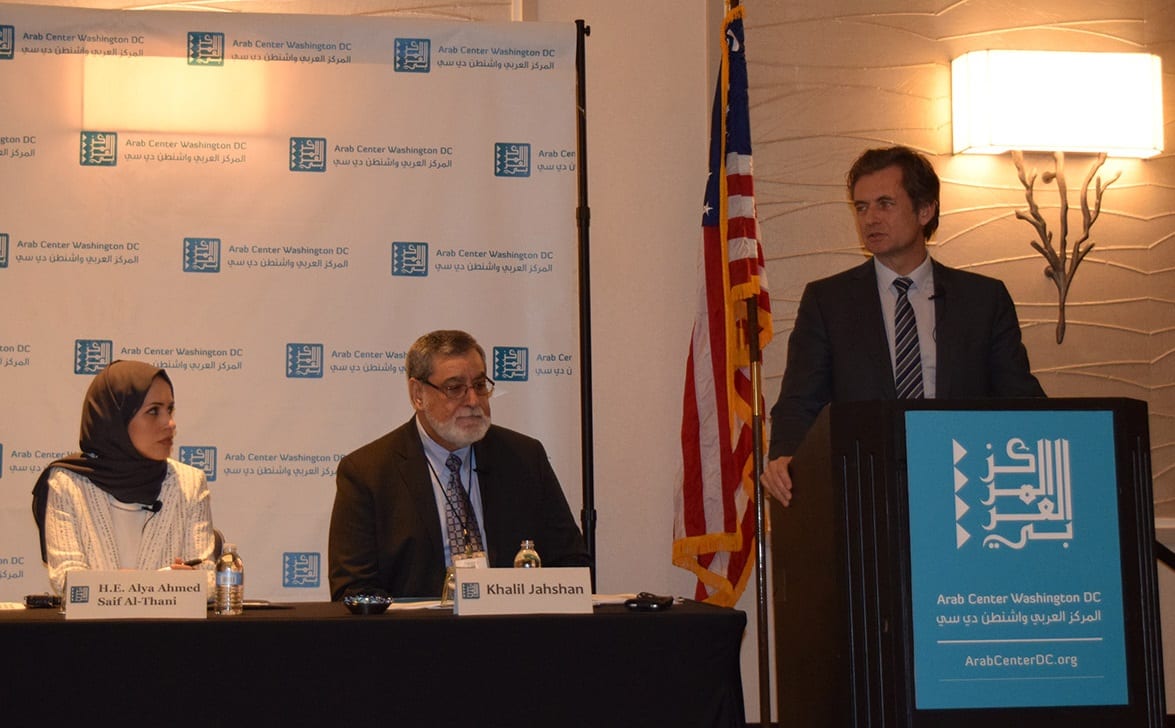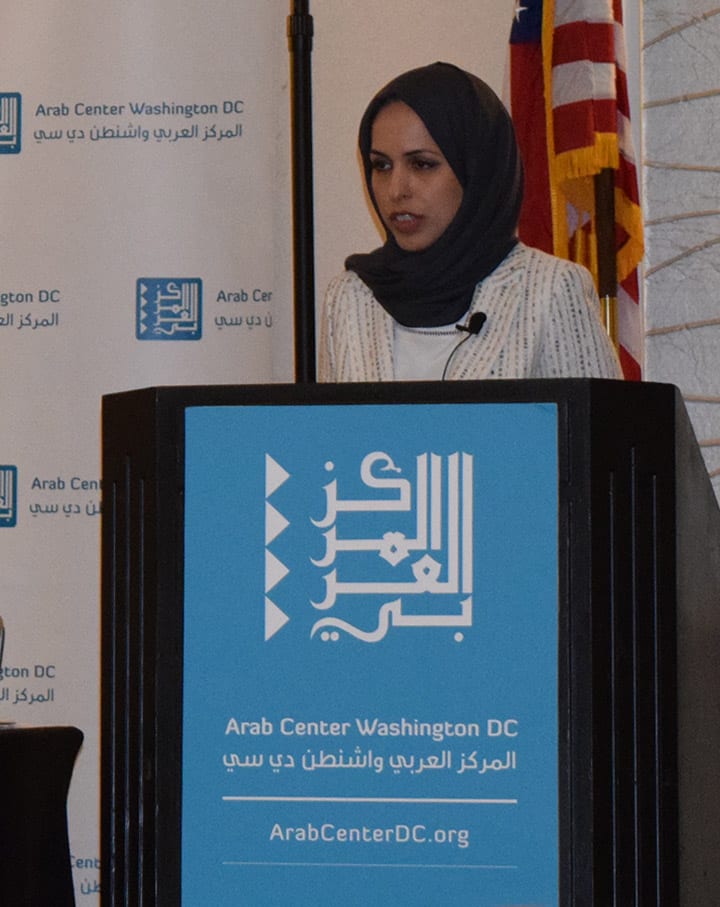Speakers

H.E. Alya Ahmed Saif Al-Thani
Permanent Representative of the State of Qatar to the United Nations

H.E. Christian Wenaweser
Permanent Representative of the Principality of Liechtenstein to the United Nations
Moderator
Event Summary
The Arab Center Washington DC (ACW) held its third “Diplomatic Luncheon” on February 8, 2017, featuring H.E. Alya Ahmed Saif Al-Thani, Permanent Representative of the State of Qatar to the United Nations, and H.E. Christian Wenaweser, Permanent Representative of the Principality of Liechtenstein to the United Nations. The event, titled “Confronting War Crimes in Syria: Accountability and International Responsibility,” was moderated by ACW’s Executive Director, Khalil Jahshan.
Mr. Jahshan briefly explained the United Nations General Assembly Resolution 71/248, titled “International, Impartial and Independent Mechanism to Assist in the Investigation and Prosecution of Persons Responsible for the Most Serious Crimes under International Law Committed in the Syrian Arab Republic.” This resolution was introduced by the two ambassadors and adopted by the UN General Assembly on December 21, 2016. It provides for an International, Impartial, and Independent Mechanism (IIIM) to address accountability for years of unchecked atrocities against civilians in Syria.
 Ambassador Christian Wenaweser described the crisis in Syria as “truly horrific.” He said that at the United Nations, there has been a strong focus on the humanitarian situation and political process in Syria, but none on accountability—which he believes is just as important. There has been documentation of abuses in Syria on a daily basis by UN entities, nongovernmental organizations, civil society actors, and others, providing overwhelming evidence of war crimes, thus making many in the United Nations feel that non-action was tantamount to complicity. In 2014, there was an effort in the Security Council to refer the Syrian conflict to the International Criminal Court, but this was vetoed by Russia and China.
Ambassador Christian Wenaweser described the crisis in Syria as “truly horrific.” He said that at the United Nations, there has been a strong focus on the humanitarian situation and political process in Syria, but none on accountability—which he believes is just as important. There has been documentation of abuses in Syria on a daily basis by UN entities, nongovernmental organizations, civil society actors, and others, providing overwhelming evidence of war crimes, thus making many in the United Nations feel that non-action was tantamount to complicity. In 2014, there was an effort in the Security Council to refer the Syrian conflict to the International Criminal Court, but this was vetoed by Russia and China.
On December 9, 2016, Canada introduced a resolution to the UN General Assembly expressing outrage regarding the siege of Aleppo and demanding an immediate end to the hostilities in Syria. After that resolution passed, the permanent representatives of Qatar and Liechtenstein felt that it was the right time to act, and they introduced Resolution 71/248. Ambassador Wenaweser explained that the United Nations has drafted the terms of reference regarding how to carry out the work of the resolution; the Commission of Inquiry, an investigative fact finding body established in 2012, will provide material based on human rights standards for the IIIM, but the IIIM goes further in that it addresses war crimes and criminal justice standards based on the Geneva Conventions.
Ambassador Wenaweser said that this includes starvation as a tactic of war, which is a war crime and completely unacceptable. He noted that the UN requires funding to implement this mechanism; voluntary contributions of some member states have been pledged, but additional funds are needed. One of the aims of the resolution, he continued, is to bring accountability into the political discussion and to provide a deterrent effect on the ground. He concluded that this is only a first step and follow up and thoughtful implementation will be very important. The Obama Administration supported this resolution, he said, but there is no indication whether the Trump Administration will continue this support.
 Ambassador Alya Ahmed Saif Al-Thani reinforced the importance of accountability when it comes to dealing with the people and the families of victims in Syria, saying that this resolution was the most practical step taken by the UN General Assembly since the beginning of the conflict in Syria in 2011. The situation in the country is most grave; the Syrian government has final responsibility to protect civilians, but year after year they have failed to do so. Without accountability, the government and opposition actors would be emboldened to continue the crimes of genocide and crimes against humanity. This resolution, therefore, will ensure respect for law and provide justice for the victims, and the documented information will pave the way for a future resolution of the conflict.
Ambassador Alya Ahmed Saif Al-Thani reinforced the importance of accountability when it comes to dealing with the people and the families of victims in Syria, saying that this resolution was the most practical step taken by the UN General Assembly since the beginning of the conflict in Syria in 2011. The situation in the country is most grave; the Syrian government has final responsibility to protect civilians, but year after year they have failed to do so. Without accountability, the government and opposition actors would be emboldened to continue the crimes of genocide and crimes against humanity. This resolution, therefore, will ensure respect for law and provide justice for the victims, and the documented information will pave the way for a future resolution of the conflict.
Ambassador Al-Thani emphasized the need to provide safe havens and no-fly zones in Syria, goals that Qatar has been pursuing for years to protect the people of Syria. She noted that many Arab states support the resolution and have displayed “ownership” regarding concern and action for the people of Syria. Nevertheless, she asserted that the accountability initiative should be a cross-regional effort; indeed, it requires funding of $5-6 million and all states should be contributing to make it viable. Beyond state actors, she said, everyone, including individuals, as well as human rights, refugee, and medical organizations, have a role to play.

